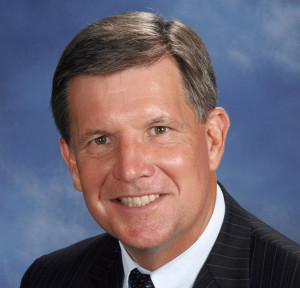When a congregation welcomes a new pastor, it is an exciting time for both the congregation and the minister. To maximize this new beginning, it is important to prepare spiritually, cognitively and emotionally for a new chapter.
Once a call to a new pastor is confirmed, there are a few things you can do personally and congregationally to prepare to follow a new spiritual leader:
First, pray for your new pastor. In most of the churches I know, members pray for the pastor search team throughout the search process, and they pray for the pastor even before they know the identity of their new minister. They also pray for their new pastor in the pastor’s inaugural days of ministry.

Barry Howard
However, I suggest making a commitment to pray daily for your pastor throughout the duration of his or her ministry. Once the “honeymoon period” is over and the daily grind of ministry begins, praying for your pastor will strengthen your pastor’s ministry and will fortify your bond with your pastor.
Second, send your pastor a welcome note or email. Be careful not to make this correspondence a lengthy epistle and certainly don’t make it a diatribe itemizing your personal expectations or agenda. Just offer a brief note, introducing yourself and/or family, and offering a heartfelt welcome.
When I moved to my last pastorate, I received more than 100 such notes, which confirmed and intensified my excitement about my new place of service.
Third, mention your name on your first several encounters with your new pastor. Once your new pastor arrives, make sure to offer your name in each greeting for the first few weeks. Learning names is important for pastors. And be sure not to embarrass the pastor by quizzing, “Do you remember my name?” Give your pastor the opportunity to learn your name and, over time, to learn a part of your life story.
Fourth, embrace the uniqueness of your pastor. Your pastor has a distinct personality, a unique set of spiritual gifts and a diverse set of experiences. When the Spirit leads a church to a new pastor, the Spirit seldom leads a church or committee to a person just like the previous pastor or the beloved pastor from the church’s history. To compare your new pastor to any other is to disrespect the Spirit’s role in guiding you to your new pastor in the first place.
Fifth, be prepared to follow. A pastor who is worth his or her salt must lead in both optimal and challenging situations. And the kingdom of God is enriched when we as a congregation follow our pastor and embrace our mission with enthusiasm.
As a veteran pastor, I am quite aware that there is a small minority of pastors who are “wolves in sheep’s clothing,” whose motives are deceptive and whose methods are manipulative, and they need to be held accountable. However, the vast majority of pastors I know provide proactive leadership that is Spirit-led and mission focused.
“The vast majority of pastors I know provide proactive leadership that is Spirit-led and mission focused.”
Don’t be a backseat driver. Serve with your best gifts.
Sixth, encourage your congregation to provide a coach for your pastor for the first 100 days or longer. The first 100 days of a new pastorate are a precious resource that should be thoughtfully and carefully spent by the pastor and the congregation. Inviting a coach to guide this process is a worthwhile investment of resources and time. The intent is to proactively engage a series of opportunities and key people. Without a thoughtful plan, the pressing agendas and needs of the church and people will crowd out the less urgent, but very important agenda that deserves attention.
Although I had several years of pastoral experience, I hired a coach a few years ago to help sharpen and update my leadership skills. I only wish I had retained a coach earlier in my ministry. The Center for Healthy Churches can assist your church in providing a leadership coach for your pastor during his or her first 100 days.
Seventh, be attentive to caring for the pastor’s family during the transition and afterward. You are not just calling a pastor; you are calling a pastor’s family. Moving is difficult for everyone, but it is perhaps even more challenging for a pastor’s family. Sometimes the children and spouse stay behind to complete the school year. Often the pastor’s family must live in temporary housing before they find a permanent home.
It is especially challenging for a pastor’s children to leave their friends behind and move to a new school and church. It is also difficult for a pastor’s spouse to transfer to a new community, a new social network, and possibly even a new place of employment.
While your church is excited about welcoming a new pastor, keep in mind that your new pastor and his or her family are going to be dealing with grief of departure even as they are trying to embrace the excitement of a new beginning. These emotions are tough to balance.
“Moving is difficult for everyone, but it is perhaps even more challenging for a pastor’s family.”
Eighth, if your new pastor moved during the pandemic, provide an opportunity for your church and community to meet the pastor’s family in-person. During the past two years, quite a few churches proceeded to call pastors via one of the many video options. A few of those pastors preached via livestream only for their first several months. Others met a few members in-person and look forward to meeting other members of the church family.
Unusual circumstances call for radical creativity. Once it is reasonably safe to do so, plan a picnic, a reception or some other fun event to welcome the pastor and family even if they have been on the field for several months. A Zoom introduction just isn’t the same as a face-to-face welcome.
Ninth, give your pastor permission to fail. The best pastors don’t succeed 100% of the time. And as churches and pastors adapt to ministry in the post-pandemic world, there will be higher degree of trial and error than there was in the pre-pandemic era.
A few weeks into one of my pastoral assignments, a sincere church member said to me, “I am glad you’re here. Every pastor I have had has disappointed me. I hope you never disappoint me.” I quickly countered, “Let me just disappoint you right now and get it out of the way. Like you, I am an imperfect human being who will make mistakes. But if we forgive one another as God has forgiven us, we will get along just fine.”
I must admit, I think my response disappointed this well-intentioned member. Don’t hold your pastor to a standard of perfection that is impossible to maintain. Allow your minister room to make mistakes.
Finally, speak positively about your pastor publicly and privately. One of the ways we bring out the best in our ministers is to speak well of them. With most pastors, it is easy to find something to criticize, because every minister has weaknesses: “He is too loud.” “She is too soft-spoken.” “He uses big words I don’t understand.” “She is not a people person.”
However, every pastor has more strengths than weaknesses. A healthy pastoral tenure is nurtured when we magnify our pastor’s strengths and then minimize and compensate for our pastor’s weaknesses.
“One of the ways we bring out the best in our ministers is to speak well of them.”
There are many other ways to welcome your new pastor and to launch your pastor into an effective and healthy tenure. If you compare them to your favorite football coach and expect them to “win every game,” not only will you be disappointed, you will make your minister miserable and ultimately ineffective.
But if you receive your new pastor as a spiritual leader sent to encourage your faithfulness, challenge your presuppositions and bring out God’s best in you, then the relationship between pastor and congregation will be vibrant and effective.
A few years ago, one of my colleagues and mentors, Hardy Clemons, reminded a group of us of the peculiar role of serving as a pastor: “Our goal is to minister; it is not to show a profit, amass a larger financial corpus or grow bigger for our own security. The ultimate goals are to accept God’s grace, share the good news, invite and equip disciples, and foster liberty and justice for all.”
And as church members, we are privileged to co-labor with our pastor in this transformative work of demonstrating grace, sharing the good news and equipping disciples.
Barry Howard serves as the pastor of the Church at Wieuca in North Atlanta. He also serves as a leadership coach with the Center for Healthy Churches. He and his wife, Amanda, currently reside in Brookhaven, Ga. His writings also appear on his blog, Barrys Notes, and you can follow him on Twitter @BarrysNotes.
Related articles:
Five ways to help your pastor this year | Opinion by Mark Wingfield
10 observations about church health for the next chapter of ministry | Opinion by Barry Howard
Need good news? Here are 10 reasons to feel optimistic about church | Opinion by Bill Wilson
Increasingly, churches are unwilling to adapt, new survey indicates


